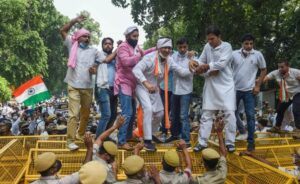As part of its suo motu cognisance proceedings of the COVID19 situation in the country, a Supreme Court bench has stated that the Central government must reconsider its vaccine policy.
The bench comprising Justices DY Chandrachud, L. Nageswara Rao and S. Ravindra Bhat directed the Centre on May 2 to design the vaccine policy in adherence to the Article 14 (Right to Equality Before The Law) and Article 21 (Right to Life) of the Constitution of India.
“While we are not passing a conclusive determination on the constitutionality of the current policy, the manner in which the current policy has been framed would prima facie result in a detriment to the right to public health which is an integral element of Article 21 of the Constitution,” the court said.
“Therefore, we believe that the Central Government should consider revisiting its current vaccine policy to ensure that it withstands the scrutiny of Articles 14 and Article 21 of the Constitution,” it added.
Last month, two vaccine manufacturers, Bharat Biotech and Serum Institute of India, whose Covishield and Covaxin vaccines respectively are being administered to citizens across India as part of the COVID19 vaccination drive announced prices of their vaccines.
On April 24, Bharat Biotech International Ltd announced that “following the directives of the Government of India”, the price of Covaxin will be Rs 600 per dose for state governments and Rs 1,200 per dose for private hospitals. The same would be exported at $15-$20 per dose. Meanwhile the same vaccine is being supplied to the central government at Rs 150 per dose, which the Indian government is distributing free of cost.
Also Read: Are you 18? This is how to register for COVID19 vaccination
On April 21, Serum Institute of India Pvt Ltd also announced the price of its Covishield vaccine — Rs 400 per dose to the state governments (now reduced to Rs 300 per dose) and to the private hospitals for Rs 600 per dose.
On April 26, the Indian government had asked both the vaccine manufacturers to lower the prices of their vaccines Covishield and Covaxin, respectively.
Also Read: Ripple effect of COVID-19’s second wave in India being felt across the globe
Highlighting that as the COVID19 vaccine manufacturers have suggested two different prices, a lower one for the Centre and a higher price for the states, the bench observed, “It is likely that compelling the State Governments to negotiate with manufacturers on the ground of promoting competition and making it attractive for new vaccine manufactures will result in a serious detriment to those in the age group of 18 to 44 years, who will be vaccinated by the State Governments.”
The order also added that many citizens who fall in this age bracket are underprivileged and do not have the ability to pay for the vaccine’s price.
The bench said that the rational method of proceeding in a manner consistent with the right to life, which includes right to health, would be for the Centre to procure all vaccines and to negotiate the price with the vaccine manufacturers.
“The vaccinations being provided to citizens constitute a valuable public good. Discrimination cannot be made between different classes of citizens who are similarly circumstanced on the ground that while the Central government will carry the burden of providing free vaccines for the 45 years and above population, the State Governments will discharge the responsibility of the 18 to 44 age group on such commercial terms as they may negotiate,” the bench stated.
These differential price announcements by the vaccine manufacturers led to strong criticism from both public health experts and the public in general.
Also, the National Human Rights Commission issued an advisory yesterday, on May 5, to the Central and the state governments to ensure that the human rights are looked after during the pandemic.
“…there should be universal coverage and non-discriminatory pricing of COVID vaccines in all health facilities in the country,” it said.
Four months back, in December 2020, Gaon Connection Insights, the data and insights arm of India’s biggest rural media platform Gaon Connection, released a one-of-its-kind rural survey on the perceptions of rural Indians around the coronavirus vaccine. Conducted across 16 states and one union territory, the survey findings were released as ‘The Rural Report 3: COVID-19 Vaccine and Rural India’, which is available in full for a free download on www.ruraldata.in
Among several other things, the survey asked the rural respondents their willingness to pay for the COVID-19 vaccine. Thirty six per cent respondents said they would not pay for the vaccine. Meanwhile, slightly less than half (44 per cent) of the respondent households expressed that they would like to pay and get the coronavirus vaccine.


















